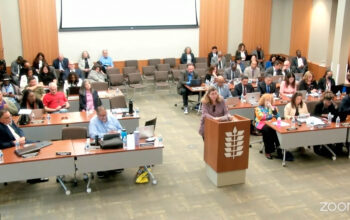Administration is looking in to the possibility of implementing a “College Hour” at Pierce College, which would enhance the student life on campus.
Having an hour dedicated to hosting student activities and engaging students beyond the classroom greatly improves academic success, according to Earic Peters, vice president of student services.
“We have wonderful ideas and wonderful intentions,” Peters said. “The issue that I’ve seen being here for six months, that many other colleges have, is when do we do it? When is there a collective time when we can really strategically look at how we’re going to engage students? This college hour is a time which we set aside for people to help plan, engage, and get involved with our students.”
Having a College Hour would mean using block scheduling, setting aside an hour so students could gather for club activities, social events or one-on-one time with professors.
Some classes could be taught during this time but would probably be single-unit classes and labs, taught by adjunct professors according to Peters.
“The research unanimously says that one of the best ways to increase student success is to get them involved with your activities beyond the classroom,” Peters said.
Other campuses have implemented college hours with varying guidelines. Since many classes are multiple days a week, some campuses have them Mondays and Wednesdays, Tuesdays and Thursdays or all week long.
“While I agree that there are so many different ways that we can engage students socially, please do not discount the importance of that face-to-face because that is really, really important,” Instructor of Nursing, Connie Tiu said.
Arguments were heard against the College Hour, saying it would be a waste of Pierce’s time and resources.
“I came from a place that had a college hour and it was a dismal failure,” Instructor of Political Science, Economics and Criminal Justice Anthony Gabrielli said. “I just don’t see how that will succeed.”
Others were interested in the idea but decided to withhold judgement until more research was done.
“I would really love to see some evidence about the impact that this is going to have on the number of students,”Angela Belden, instructor of psychology said. “In part of that campus climate, we need to have things on campus for students to do, places for them to eat. So this is part of an overall climate that needs to shift.”
Peters thinks the hour will be an effective way for students to network with one another and with faculty outside a set curriculum, further contributing to their experience on campus and their attachment to the school.
“There’s not a lot of research in exactly ‘College Hour,’ but there’s a ton of research in engagement,” Peters said.
Gabrielli is worried that students these days are less interested in making personal connections and focus more on networking digitally.
“Students will start to schedule their classes opposite of college hour. They’ll come Mondays and Wednesdays and they’ll just have work Tuesdays and Thursdays,” he said. “This is not a panacea and I think one of the things the research weeds out is that we’re in a new age. My students would rather see me on Twitter than face to face. They’d rather see me on Facebook than face to face.”
The discussion was far from unanimous, with many expressing concerns over the marketing, scheduling, and use of such an hour on campus.



